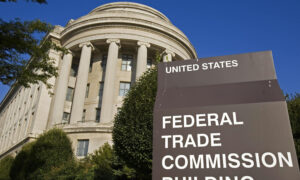FTC Targets Telemarketing Fraudsters in New Operation

The U.S. Federal Trade Commission (FTC) has announced a nationwide operation targeting illegal telemarketing calls as well as taking action against activities that employ deceptive tactics to collect people’s phone numbers.
“We are taking action against those who trick people into phony consent to receive these calls and those who make it easy and cheap to place these calls,” said Samuel Levine, director of the FTC’s Bureau of Consumer Protection, in an FTC news release on July 18.
According to the agency, “Today’s actions make clear that third-party lead generation for robocalls is illegal under the Telemarketing Sales Rule (TSR) and that the FTC and its partners are committed to stopping illegal calls by targeting anyone in the telemarketing ecosystem that assists and facilitates these calls, including VoIP service providers,” referring to voice over internet protocol.
A robocall is a phone call in which the receiver hears a recorded message instead of a live human. They are usually done for sales purposes, with many of them falling under scams.
Under “Operation Stop Scam Calls,” the FTC has collaborated with more than 100 state and federal law enforcement partners across the United States, including attorneys general from all 50 states and Washington, D.C.
The operation aims to take action against telemarketers and companies that “deceptively collect and provide consumers’ telephone numbers to robocallers and others, falsely representing that these consumers have consented to receive calls,” according to a July 18 press release.
According to the Federal Communications Commission (FCC), U.S. consumers receive around four billion robocalls every month.
An FTC report from February this year revealed that 294,659 Americans were defrauded last year from “phone call” scams—with victims losing $798 million in total.
The median amount lost by a victim was $1,400—the highest among the eight categories listed in the report, which include text messages, emails, websites, mails, and online ads.
The agency has filed a total of 167 cases against illegal robocallers and Do Not Call violators, with the court ordering the defendants to pay over $2 billion in these cases.
The FTC has presently collected more than $394 million from the defendants, with much of the money being used to provide refunds to customers who have been victims of fraud.
“Today, government agencies at all levels are united in fighting the scourge of illegal telemarketing,” said Mr. Levine.
“We are taking action against those who trick people into phony consent to receive these calls and those who make it easy and cheap to place these calls.”
Identifying Telemarketing Scams
According to a consumer alert issued by the Office of the Attorney General for the District of Columbia, there are some warning signs that can indicate whether the caller is a telemarketing scammer.
This includes calls asking for financial information to confirm identity, calls from a stranger seeking help to transfer money out of a foreign nation, calls which claim that you have won a free gift or prize but asks you to pay a fee or attend a presentation, and calls that offer a limited time offer.
To avoid unwanted telemarketing calls, people can add their phone numbers to the FTC’s national “Do Not Call” registry by either registering their number at www.donotcall.gov or calling 888-382-1222.
According to a November 2022 press release by the FTC, more than 2.5 million people signed up for the Do Not Call registry for fiscal year 2022, bringing the total number of phone numbers in the database to over 246 million.
While adding a number to the registry can help in avoiding telemarketing calls, it is not 100 percent guaranteed. Telemarketers can still use loopholes and contact such numbers.
As such, in addition to placing the phone number in the Do Not Call registry, people can also make use of other solutions like using a blocking service. These apps are offered by telephone service providers and block out unwanted calls like those from anonymous numbers.
FTC’s Telemarketing Scam Cases
In the July 18 press release, FTC also listed five new illegal telemarketing cases which came under the purview of Operation Stop Scam Calls.
One case is about a company called Fluent LLC that tricked consumers into receiving marketing solicitations. The company operated as a “consent farm lead generator,” claiming to secure people’s agreement to receive marketing solicitation, including telemarketing calls.
The company and its affiliates used “deceptive ads” that falsely promised employment opportunities or free valuable items. The ads directed people to a website that tricked them into providing personal information as well as consent to receive marketing calls. Fluent is said to have obtained and sold over 620 million telemarketing leads.
Another case is related to a solar company called Vision Solar. The firm’s telemarketers placed tens of millions of calls to consumers listed in the Do Not Call registry, falsely claiming to be affiliated with a government agency or utility firm.
It then misrepresented to the people that they could expect to save an amount of money on their energy bills by buying and installing solar panels.




